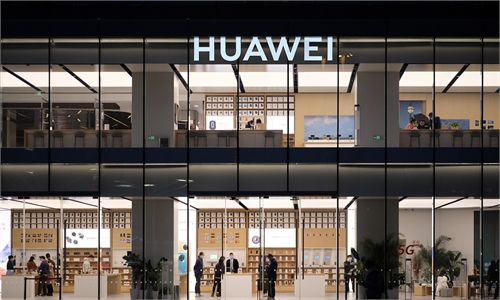
A Huawei store stands next to a Globe Telecom booth in Makati City, the Philippines on April 14, 2019. Photo: cnsphoto
The UK's decision over Huawei, which could take the form of a ban on the Chinese equipment maker's involvement in the country's 5G construction, could add a heavy burden to its struggling economy amid the pandemic and further strain bilateral political ties at a highly sensitive moment, Chinese observers said.
The UK is set to announce a decision of whether to allow Huawei's access to its 5G network construction on Tuesday.
Some reports, citing officials close to the deal, said that the UK may phase out over several years the small amount of Huawei 5G equipment that was installed in recent months.
"China will closely watch the decision," Zhao Lijian, spokesperson of the Chinese Foreign Ministry, said at a regular press conference on Tuesday, noting that the move could be an "indicator" of whether it's safe for China to continue its investment in the country. It could also serve as a touchstone of the market trend in the UK after Brexit.
The decision can also show whether the UK can provide an open, fair and non-discriminatory business environment for Chinese companies in the country, Zhao warned.
The UK's looming change and its vacillating attitude toward the firm in recent times has been driven by multiple factors - intensified US pressure and the eagerness to maintain its massive untold interests in the Hong Kong Special Administrative Region under China's national security law, Cui Hongjian, the director of the Department of European Studies at the China Institute of International Studies, told the Global Times.
The UK decided in January to let Huawei continue its role in the country's 5G network, but with restrictions. The company was excluded from providing "core" 5G gear, despite pressure from the US to crack down on the Chinese firm.
The UK is aware that it's not a smart move to reverse its policy on Huawei, as the nation can't afford the consequences, ranging from the industrial impact - which could be millions of dollars - to the harm done to China-UK ties, analysts said. They noted that a changing political situation has turned the economic issue into more than a political problem.
Huang Haifeng, an independent observer of the high-technology sector, told the Global Times that replacing Huawei gear in the UK would cost the nation enormously and take at least a few years.
"It will only add to the woes of the UK's economy, which is struggling to recover from COVID-19 disruptions," said Huang.
Moreover, the UK will lose its opportunity to take the lead in 5G deployment, sacrifice the business interests of its telecom operators, and raise mounting doubts over its investment environment due to its attitude toward a Chinese firm that has fully obeyed international practices and rules, said analysts.
As to Huawei itself, confidence in its 5G gear expansion in overseas markets would not be heavily affected, said Ma Jihua, an industry veteran analyst. This can be inferred from the timing that the unlisted Chinese company chose for the release of its semi-annual earnings - one day prior to the UK's anticipated announcement.
Huawei regularly releases such reports at month-end.
"The decision also has an impact on the UK's independent diplomacy, as it bows more to US pressure to crack down on Huawei," Ma noted.
Huawei's revenue hit 454 billion yuan ($64.88 billion) in the first half of 2020, up 13.1 percent year-on-year, with a net profit margin of 9.2 percent, a hard-won feat that beat forecasts amid the pandemic and the intensified US crackdown.
Huawei's carrier, enterprise, and consumer businesses had revenues of 159.6 billion yuan, 36.3 billion yuan, and 255.8 billion yuan respectively, all up slightly compared with the same time last year.
"Huawei has promised to continue fulfilling its obligations to customers and suppliers, and to survive, forge ahead and contribute to the global digital economy and technological development, no matter what future challenges the company faces," the firm said.





